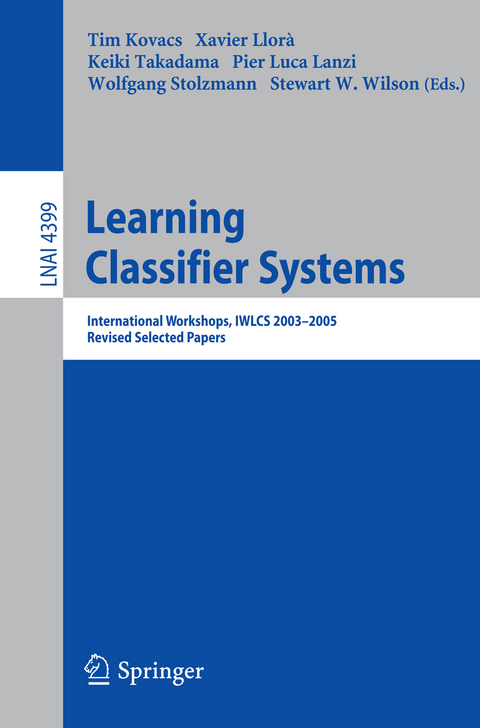
Learning Classifier Systems
Springer Berlin (Verlag)
978-3-540-71230-5 (ISBN)
Knowledge Representation.- Analyzing Parameter Sensitivity and Classifier Representations for Real-Valued XCS.- Use of Learning Classifier System for Inferring Natural Language Grammar.- Backpropagation in Accuracy-Based Neural Learning Classifier Systems.- Binary Rule Encoding Schemes: A Study Using the Compact Classifier System.- Mechanisms.- Bloat Control and Generalization Pressure Using the Minimum Description Length Principle for a Pittsburgh Approach Learning Classifier System.- Post-processing Clustering to Decrease Variability in XCS Induced Rulesets.- LCSE: Learning Classifier System Ensemble for Incremental Medical Instances.- Effect of Pure Error-Based Fitness in XCS.- A Fuzzy System to Control Exploration Rate in XCS.- Counter Example for Q-Bucket-Brigade Under Prediction Problem.- An Experimental Comparison Between ATNoSFERES and ACS.- The Class Imbalance Problem in UCS Classifier System: A Preliminary Study.- Three Methods for Covering Missing Input Data in XCS.- New Directions.- A Hyper-Heuristic Framework with XCS: Learning to Create Novel Problem-Solving Algorithms Constructed from Simpler Algorithmic Ingredients.- Adaptive Value Function Approximations in Classifier Systems.- Three Architectures for Continuous Action.- A Formal Relationship Between Ant Colony Optimizers and Classifier Systems.- Detection of Sentinel Predictor-Class Associations with XCS: A Sensitivity Analysis.- Application-Oriented Research and Tools.- Data Mining in Learning Classifier Systems: Comparing XCS with GAssist.- Improving the Performance of a Pittsburgh Learning Classifier System Using a Default Rule.- Using XCS to Describe Continuous-Valued Problem Spaces.- The EpiXCS Workbench: A Tool for Experimentation and Visualization.
| Erscheint lt. Verlag | 19.3.2007 |
|---|---|
| Reihe/Serie | Lecture Notes in Artificial Intelligence | Lecture Notes in Computer Science |
| Zusatzinfo | XII, 345 p. |
| Verlagsort | Berlin |
| Sprache | englisch |
| Maße | 155 x 235 mm |
| Gewicht | 557 g |
| Themenwelt | Informatik ► Datenbanken ► Data Warehouse / Data Mining |
| Informatik ► Theorie / Studium ► Künstliche Intelligenz / Robotik | |
| Schlagworte | adaptive exploration rate • Algorithmic Learning • algorithms • Approximation • classification • Complexity • constraints • Data Analysis • Data Mining • decision trees • evolutionary algorithms • feature extraction • Function approximation • fuzzy • Fuzzy Sets • Genetic Algorithm • Hardcover, Softcover / Informatik, EDV/Informatik • HC/Informatik, EDV/Informatik • Knowledge Discovery • Knowledge Representation • learning • Optimization • proving • Reinforcement Learning • Rule Induction • vagueness |
| ISBN-10 | 3-540-71230-5 / 3540712305 |
| ISBN-13 | 978-3-540-71230-5 / 9783540712305 |
| Zustand | Neuware |
| Informationen gemäß Produktsicherheitsverordnung (GPSR) | |
| Haben Sie eine Frage zum Produkt? |
aus dem Bereich


